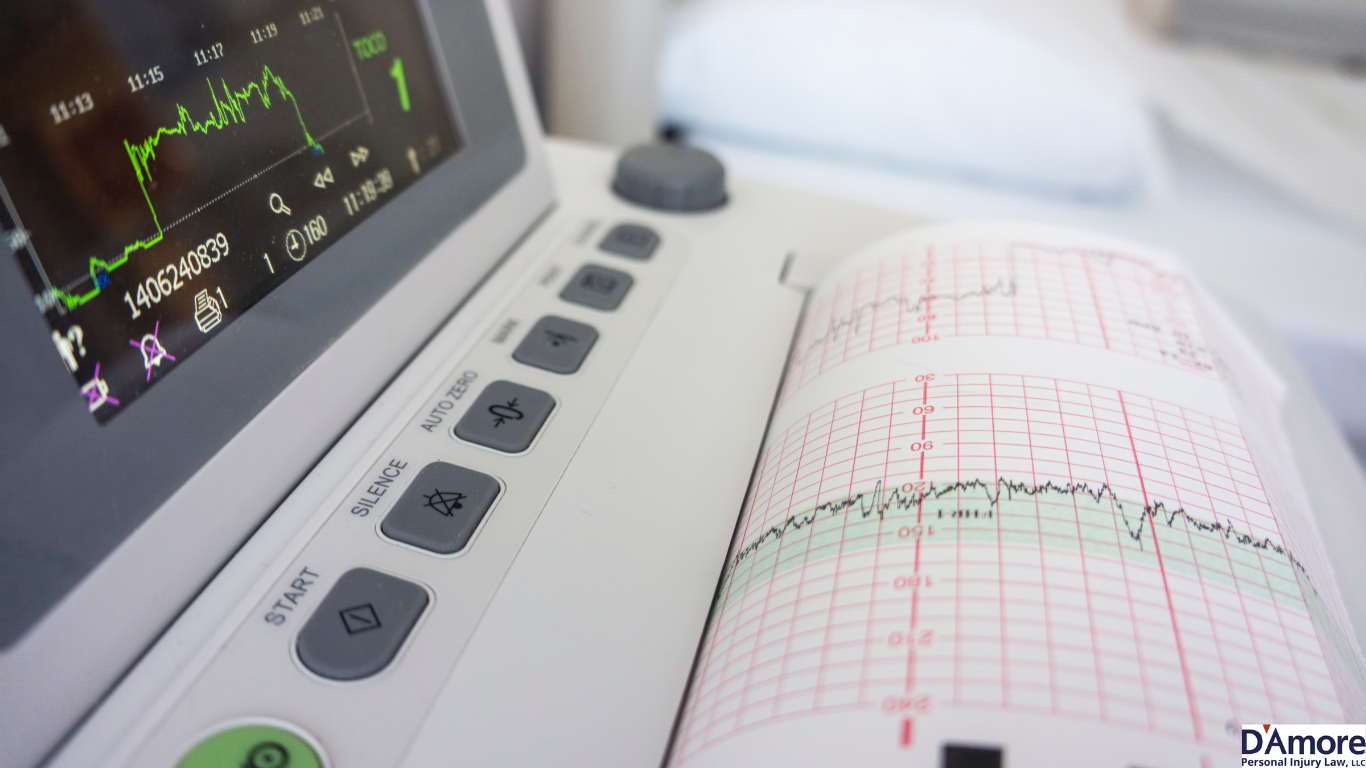Understanding Improper Fetal Heart Monitoring
Expecting parents rely on healthcare providers to ensure the safety and well-being of both mother and baby during pregnancy and childbirth. One critical aspect of this care is fetal heart monitoring, which tracks the baby’s heart rate to detect signs of distress or complications. Unfortunately, improper fetal heart monitoring can lead to devastating outcomes, including birth injuries or even death. If this has happened to you or your child in Maryland, it’s essential to understand what went wrong and your legal rights.
What Is Fetal Heart Monitoring?
Fetal heart monitoring is a medical procedure used to measure the baby’s heart rate during labor and delivery. The baby’s heart rate provides important information about the baby’s oxygen levels and overall health. There are two main types of fetal heart monitoring:
- External Monitoring: This involves placing a device called a Doppler ultrasound transducer on the mother’s abdomen to measure the baby’s heart rate.
- Internal Monitoring: In certain cases, a small electrode is attached to the baby’s scalp to provide more accurate and continuous readings of the baby’s heart rate.
Healthcare providers must interpret the results of fetal heart monitoring correctly to identify any signs of fetal distress, such as oxygen deprivation or irregular heartbeats. Quick and appropriate action can prevent long-term injuries or complications.
Common Errors in Fetal Heart Monitoring
Improper fetal heart monitoring occurs when healthcare providers fail to correctly monitor or interpret the baby’s heart rate, leading to delayed or inappropriate responses. Some common errors include:
- Failure to Monitor Continuously: Not monitoring the fetal heart rate continuously during labor when it is medically necessary.
- Misinterpreting the Heart Rate Patterns: Incorrectly identifying patterns that indicate fetal distress, such as bradycardia (slow heart rate) or tachycardia (fast heart rate).
- Ignoring Signs of Fetal Distress: Overlooking or dismissing clear indications that the baby is in distress, such as a prolonged decrease in heart rate.
- Delays in Intervention: Failing to take timely actions, such as performing an emergency C-section when the baby’s oxygen supply is compromised.
- Inadequate Training: A lack of training or experience in using fetal monitoring equipment or interpreting results.
Each of these errors can have severe consequences for both mother and child, including brain injuries, developmental delays, or physical disabilities.
How Improper Monitoring Causes Harm
When healthcare providers fail to monitor the fetal heart rate properly, they risk missing critical warning signs of complications. For example:
- Oxygen Deprivation (Hypoxia): Prolonged periods of oxygen deprivation can lead to brain damage and conditions such as cerebral palsy.
- Delayed Delivery: If fetal distress is not identified promptly, delays in performing a necessary C-section can result in life-threatening complications for the baby and mother.
- Stillbirth: In the worst-case scenario, improper monitoring can result in the baby’s death.
These injuries can leave families facing overwhelming medical expenses, emotional trauma, and a lifetime of care for a child with special needs.
Medical Standards for Fetal Heart Monitoring
Healthcare providers are held to high standards when it comes to fetal heart monitoring. They must:
- Follow Established Protocols: Use appropriate monitoring methods based on the mother’s health and pregnancy complications.
- Recognize Risk Factors: Identify situations that require closer monitoring, such as high-risk pregnancies, prolonged labor, or signs of infection.
- Act Quickly in Emergencies: Make timely decisions to address fetal distress, including ordering a C-section or other necessary interventions.
When providers fail to meet these standards, they may be held accountable for medical malpractice.
Recognizing the Signs of Improper Monitoring
If your baby has suffered an injury during childbirth, it may be linked to improper fetal heart monitoring. Common signs include:
- Unexplained developmental delays or neurological issues.
- Diagnosis of a condition like cerebral palsy shortly after birth.
- A birth injury that required immediate medical intervention.
- Lack of communication from medical staff about complications during delivery.
If any of these apply to your situation, consulting a Maryland medical malpractice lawyer can help you understand your legal options.
Proving Negligence in Maryland
To pursue a medical malpractice claim for improper fetal heart monitoring in Maryland, you must prove the following:
- Duty of Care: The healthcare provider owed you and your baby a duty to provide competent medical care.
- Breach of Duty: The provider failed to meet the standard of care, such as by improperly monitoring the fetal heart rate or ignoring signs of distress.
- Causation: The provider’s negligence directly caused your baby’s injury or complications.
- Damages: You suffered measurable harm, such as medical expenses, pain and suffering, or lost quality of life.
Maryland’s medical malpractice laws can be complex, and there are strict deadlines for filing a claim. A skilled attorney can help you navigate the process and gather the evidence needed to prove your case.
Maryland Improper Fetal Heart Monitoring Lawyer
If you or your child has suffered harm due to improper fetal heart monitoring, you deserve justice. The experienced Maryland medical malpractice lawyers at D’Amore Personal Injury Law, LLC can help you understand your legal rights and options. Our team is committed to holding negligent healthcare providers accountable and securing the compensation you need for your child’s future.
Contact D’Amore Personal Injury Law, LLC by calling (410) 846-0284 or contacting us online for a consultation. Don’t wait to seek the answers and support you deserve.
FREE Case Consultation
Fill out the form below and we will contact you.
Or, give us a call at
410-324-2000

What Makes Motorcycle Accident Lawsuits Different?
Motorcycle riders have the same rights as all other road users, yet they are often overlooked or disregarded by other

Understanding Medical Malpractice Settlements in Maryland
Understanding Medical Malpractice Settlements in Maryland Medical malpractice cases can be emotionally and financially devastating for victims and their families.

How Long Does It Take to Settle a Traumatic Brain Injury Case in Maryland?
How Long Does It Take to Settle a Traumatic Brain Injury Case in Maryland? Traumatic brain injuries (TBIs) can have
